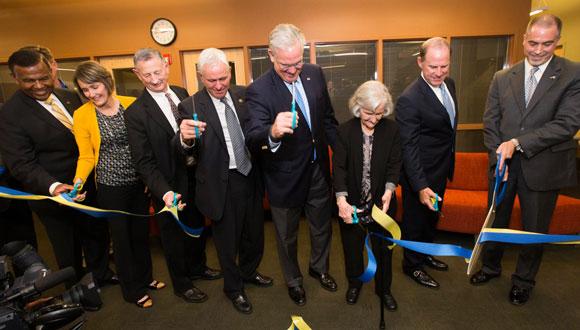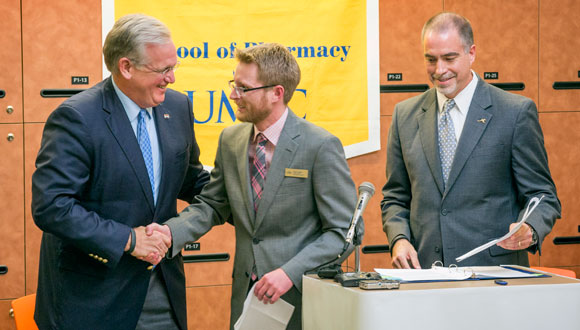Gail Borelli // Spring 2015

The UMKC School of Pharmacy has hit upon a formula for increasing the number of health-care professionals in rural Missouri.
The school’s new satellite campus in Springfield is enrolling students who otherwise might not be able to pursue their Pharm.D. The Springfield facility welcomed its first class in August 2014, joining a satellite campus in Columbia that opened in 2005.
Among the 30 students in the first cohort is Robert Hopkins, a pharmacy technician in Springfield. Hopkins, 32, attended the ceremony in 2011 at which Missouri Gov. Jay Nixon pledged to expand the UMKC School of Pharmacy to Springfield. Hopkins was intrigued by the prospect of returning to college and broached the subject with his wife. The potential commitment was huge for the young family, because for three years, Hopkins would have to work full-time while taking the prerequisites needed for pharmacy school.
The opportunity to earn his Pharm.D. in Springfield was especially appealing. Hopkins and his wife are Springfield natives with two young children, a mortgage and deep ties to the area. Pulling up those stakes and moving to Kansas City or UMKC’s Columbia for pharmacy school was not an option.

Now Hopkins works two days a month at a Springfield pharmacy and focuses on his coursework. The Post-9/11 GI Bill helps pay for his school.
”I have to do lots of studying, and sometimes my 4-year-old daughter gets a little upset about that,” he says. “My wife has to take on a bigger role, but we’re making it work. Our eyes are on the prize.” Hopkins is scheduled to graduate in 2018.
Other students in the inaugural class have similar stories, says School of Pharmacy Dean Russell Melchert. The hope is that many of the Springfield graduates will remain in rural Missouri, which suffers a shortage of health-care providers, including pharmacists. There is a precedent: A large number of the Columbia pharmacy graduates have taken their first jobs in and around central Missouri and surrounding rural areas, Melchert says.
The Springfield pharmacy students are officially registered at UMKC but have access to select courses at Missouri State University, as well as its student health facility, library and fitness center. Classes are held in a renovated Brick City icehouse that is leased from MSU.
State funding of $2 million a year has helped pay for the long-term lease and for renovations to the 15,000-square-foot space. Three classrooms are equipped with video-conferencing equipment that supports the synchronous transmission of classes among the Kansas City, Columbia and Springfield sites.
“We were broadcasting analog video from UMKC to MU prior to 2014,” Melchert says. “You can’t even buy anything new that will use analog signals, yet we needed new equipment for Springfield. So we replaced all of it at each site, which required upgrades and renovations in Kansas City and Columbia.”
Now Springfield students can interact with professors and other students during lectures, regardless of their location. “It’s an amazing facility,” Hopkins says of the Brick City building. “Everything is brand-new. There are enormous TV screens and cameras everywhere. It’s like a very fancy Skype. You feel like you are sitting there with the professor.
“The UMKC pharmacy faculty work hard not to forget us. They are all wonderful.”
In addition to the long-distance Kansas City faculty, the Springfield campus has hired an associate dean and two faculty members, and four new faculty are being recruited, Melchert says. Thirty students will be added each academic year until total enrollment of 120 is reached.
“There’s such a large range of things that can be done in a pharmacy career,” Hopkins says. “Now pharmacists can give vaccines and flu shots. And there is talk about giving them provider status so they could do more, such as prescribe antibiotics.
“That’s huge for rural areas.”
